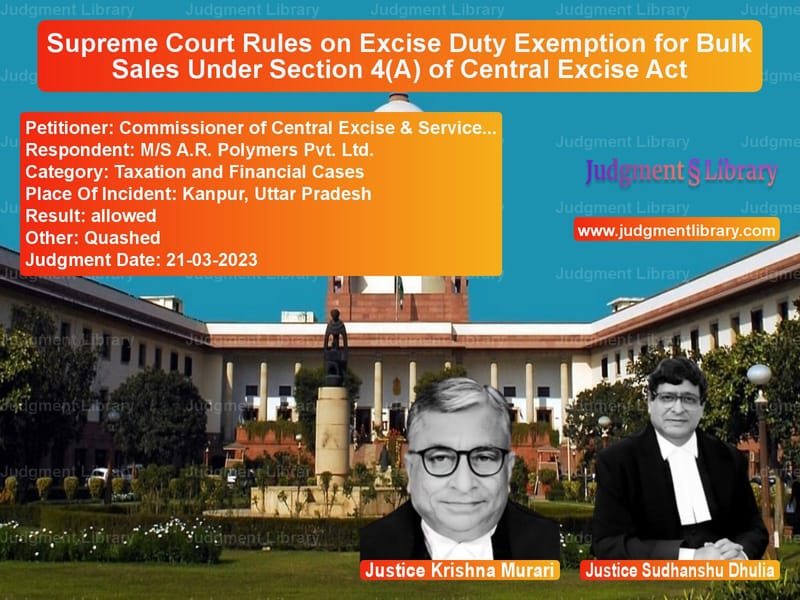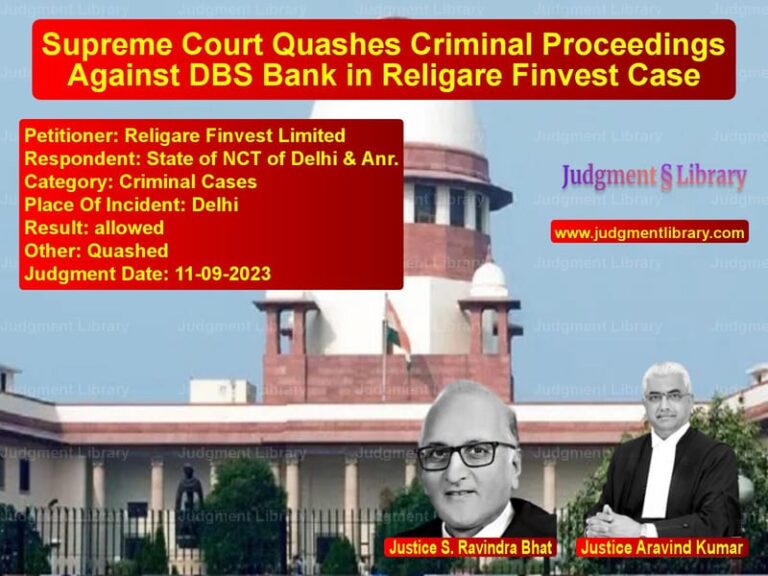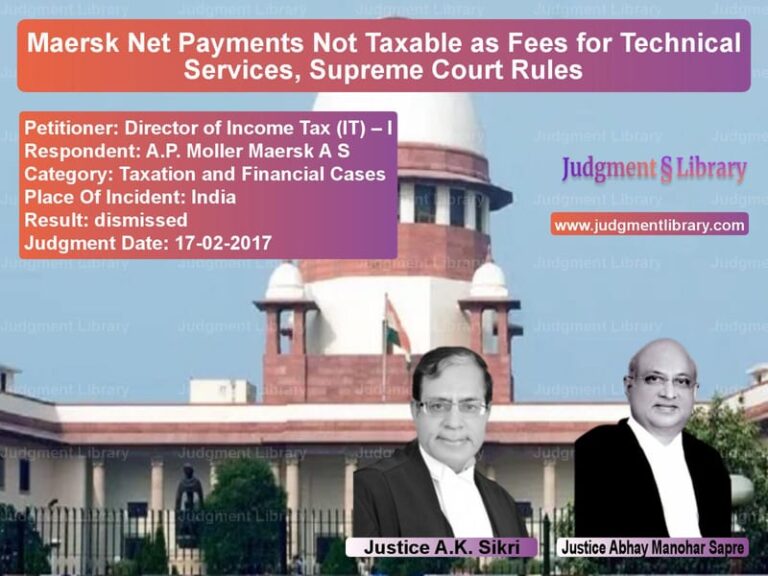Supreme Court Rules on Excise Duty Exemption for Bulk Sales Under Section 4(A) of Central Excise Act
The case of Commissioner of Central Excise & Service Tax, Kanpur vs. M/S A.R. Polymers Pvt. Ltd. involves a dispute regarding the eligibility of bulk sales to claim excise duty exemption under Section 4(A) of the Central Excise Act, 1944. The Supreme Court ruled that sales made to institutional consumers, such as paramilitary and military forces, do not qualify for excise duty exemptions meant for retail sales.
Background of the Case
M/S A.R. Polymers Pvt. Ltd., the respondent, is a manufacturer engaged in the production of footwear and sells these products in bulk to defense and paramilitary forces. The dispute arose when the respondent claimed excise duty exemption under Notification No. 12/2012-CE, which applies to footwear sold in retail. However, tax authorities contended that bulk sales do not qualify for this exemption.
Key events in the dispute:
- 2012: The respondent availed benefits under Notification No. 12/2012-CE and Section 4(A) of the Central Excise Act, reducing its excise tax liability.
- 2016: The Directorate General of Central Excise Intelligence (DGCEI) inspected the respondent’s premises and found that the company was affixing Maximum Retail Price (MRP) stickers on bulk-sale footwear to claim tax exemptions.
- February 5, 2016: A show cause notice was issued to the respondent, requiring them to justify their tax deductions.
- February 13, 2017: The adjudicating authority ruled that the respondent was not eligible for the tax exemption and ordered payment of differential tax along with penalties.
- January 9, 2019: The Customs, Excise, and Service Tax Appellate Tribunal (CESTAT), Allahabad, overturned the tax authority’s decision, ruling in favor of the respondent.
- March 21, 2023: The Supreme Court set aside the CESTAT decision and upheld the tax authority’s findings.
Arguments by the Appellant (Tax Authorities)
The tax department argued that:
- The exemption under Section 4(A) of the Central Excise Act applies only to retail sales, not bulk sales.
- The respondent’s sales to paramilitary and military forces constituted institutional sales, not retail sales.
- The respondent fraudulently affixed MRP stickers to bulk-sale products to evade higher tax rates.
- Under Rule 3(b) of the Legal Metrology (Packaged Commodities) Rules, 2011, sales to institutional consumers are exempt from mandatory MRP labeling, making the respondent’s actions ineligible for exemption.
Arguments by the Respondent (M/S A.R. Polymers Pvt. Ltd.)
The respondent defended their tax exemption claim, asserting that:
- The footwear sold was properly labeled with MRP, making it eligible for Section 4(A) benefits.
- The tax authorities unfairly targeted their business despite compliance with notification rules.
- The CESTAT had correctly ruled in their favor by recognizing that the company had followed required procedures.
Supreme Court’s Judgment
The Supreme Court ruled in favor of the tax authorities, finding that the respondent was not eligible for excise duty exemptions under Section 4(A).
1. Exemptions Under Section 4(A) Apply Only to Retail Sales
The Court reaffirmed that tax benefits under Section 4(A) are exclusively for retail sales and do not extend to bulk sales:
“For goods to be included under the assessment of Section 4(A), they must comply with five factors, including being sold in a retail package and requiring MRP declaration under law.”
2. Institutional Sales Do Not Qualify as Retail Sales
The Court ruled that the respondent’s sales to paramilitary and military forces were institutional sales, not retail transactions:
“Since the purchasers in this case—military and paramilitary institutions—procure goods in bulk and distribute them further, they do not qualify as retail consumers.”
3. Legal Metrology Rules Exempt Institutional Sales from MRP Requirements
The Court cited Rule 3(b) of the Legal Metrology (Packaged Commodities) Rules, 2011, which exempts institutional sales from MRP labeling requirements. This meant the respondent could not claim tax benefits meant for retail products:
“Due to institutional purchasers being exempt from mandatory MRP labeling, the transaction is ineligible for tax benefits under Section 4(A).”
4. Mere Affixation of MRP Stickers Does Not Qualify a Sale for Tax Benefits
The Supreme Court clarified that merely affixing an MRP sticker does not automatically make a product eligible for retail tax exemptions:
“There must be a statutory requirement for affixing MRP. Mere voluntary affixation does not bring goods under the ambit of Section 4(A).”
Final Ruling
The Supreme Court:
- Set aside the CESTAT’s ruling.
- Held that the respondent must pay the differential tax as ordered by the adjudicating authority.
- Clarified that bulk sales to institutions do not qualify for excise duty exemptions meant for retail sales.
Conclusion
This ruling establishes a crucial precedent in taxation law, affirming that excise duty exemptions under Section 4(A) of the Central Excise Act apply strictly to retail sales. The decision ensures that institutional sales do not misuse exemptions meant for consumer transactions and reinforces compliance with tax regulations.
Petitioner Name: Commissioner of Central Excise & Service Tax, Kanpur.Respondent Name: M/S A.R. Polymers Pvt. Ltd..Judgment By: Justice Krishna Murari, Justice Sudhanshu Dhulia.Place Of Incident: Kanpur, Uttar Pradesh.Judgment Date: 21-03-2023.
Don’t miss out on the full details! Download the complete judgment in PDF format below and gain valuable insights instantly!
Download Judgment: commissioner-of-cent-vs-ms-a.r.-polymers-pv-supreme-court-of-india-judgment-dated-21-03-2023.pdf
Directly Download Judgment: Directly download this Judgment
See all petitions in Income Tax Disputes
See all petitions in GST Law
See all petitions in Tax Evasion Cases
See all petitions in Banking Regulations
See all petitions in Tax Refund Disputes
See all petitions in Judgment by Krishna Murari
See all petitions in Judgment by Sudhanshu Dhulia
See all petitions in allowed
See all petitions in Quashed
See all petitions in supreme court of India judgments March 2023
See all petitions in 2023 judgments
See all posts in Taxation and Financial Cases Category
See all allowed petitions in Taxation and Financial Cases Category
See all Dismissed petitions in Taxation and Financial Cases Category
See all partially allowed petitions in Taxation and Financial Cases Category







